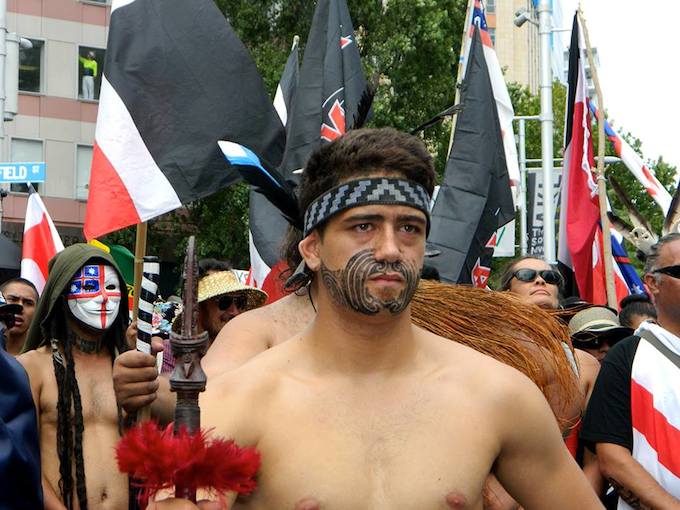
One of the biggest and most controversial trade deals in history has been signed by ministers from the Asia-Pacific region and the Americas, as tens of thousands of protesters hit the streets to denounce it.
Security was stepped up across Auckland for representatives who travelled here to sign the Trans-Pacific Partnership (TPP) – a deal involving 12 economies worth about $28 trillion.
Prime Minister John Key said the deal would benefit everybody.
“The opening of our markets will enhance the lives of our people. The TPP will make new trade opportunities. It is overwhelmingly in the best interests of our countries and our citizens,” Key said.
The TPP is a free trade agreement promising to liberalise trade and investment between the 12 nations, which make up about 36 percent of the world’s GDP.
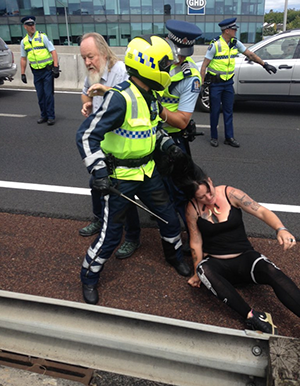
The deal – which will cut tariffs, improve access to markets and sets common ground on labour and environmental standards and intellectual property protections – was finally reached in October after five years of negotiations.
It includes Australia, Brunei, Canada, Chile, Japan, Malaysia, Mexico, New Zealand, Peru, Singapore, the US, and Vietnam.
Cheaper access
The TPP is supposed to ensure everyone from Vietnamese shrimpers to New Zealand dairy farmers get cheaper access to markets and bring in economic benefits.
Ministers received a traditional Māori welcome from members of the Ngati Whatua tribe – including a hongi, which involves the pressing of noses and exchange of breath.
But the welcome wasn’t as warm in downtown Auckland where thousands of protesters from different groups blockaded the inner city in a rally against the deal.
Many carried flags and banners and chanted outside the SkyCity convention centre where the signing took place.
Protest organisers estimated the crowd to be more than 20,000 – it was one of the biggest protests seen in New Zealand since the 1981 Springbok tour.
‘No balance of interests’
Rowan Brooks, a protest organiser, said he was concerned about the power the agreement would give to big corporations.
“Basically it eats away at New Zealand’s sovereignty and the whole process was undemocratic… The agreement gives power to corporations and takes it away from the people,” Brooks said.
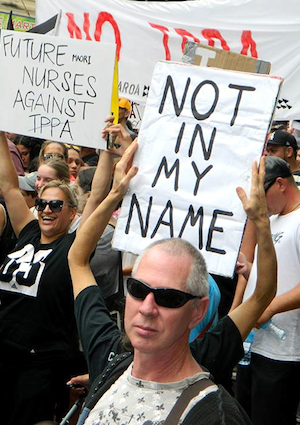
Jane Kelsey, a law professor at the University of Auckland, is one of the agreement’s fiercest critics.
She said she was concerned about how the deal could be used by the US to counter China’s influence in the region.
“It’s kind of a Cold War by proxy of trade and investment agreements,” Kelsey said. “And that’s a real worry because not only do the corporations who have special insights and input to this agreement get to be centre stage but there is no balance of interests.”
The deal has not only triggered protests in New Zealand but has also drawn international criticism.
Former World Bank economist Joseph Stiglitz said it “may turn out to be the worst trade agreement in decades”.
Investors’ right to sue
In an opinion piece for the Guardian, Stiglitz wrote: “It gives foreign investors the right to sue governments in private international tribunals when they believe government regulations contravene the TPP’s terms.
“In 2016, we should hope for the TPP’s defeat and the beginning of a new trade era of agreements that don’t reward the powerful and punish the weak.”
The TPP is expected to come into force within two years, once countries have completed their domestic legislative procedures.
Questions have been raised over the ratification process as it coincides with the buildup to this year’s US presidential election. But US trade representative Michael Froman is confident it will be passed by the US Congress.
“We all have our domestic processes to go through and ours is clearly laid out… I believe at the end of the day… We will have the necessary bipartisan support for it to be approved,” he said.
A version of this article first appeared on Al Jazeera.



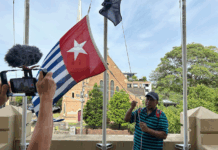
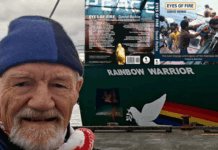

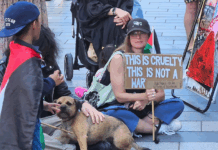























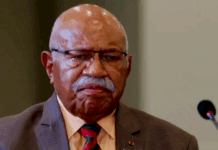











[…] Controversial TPP signed amid huge Auckland protests […]
[…] National government ignored widespread opposition from ordinary New Zealanders when it signed the secretly negotiated deal. Doubtless we’ll continue to be fed the old Anzus line that New Zealand can’t afford to not to […]
Comments are closed.